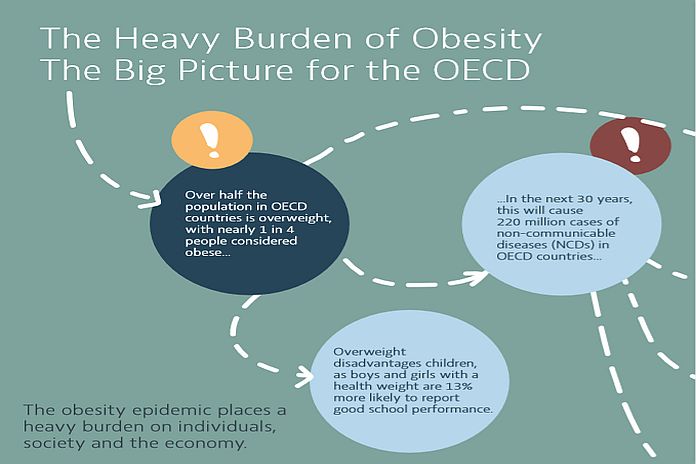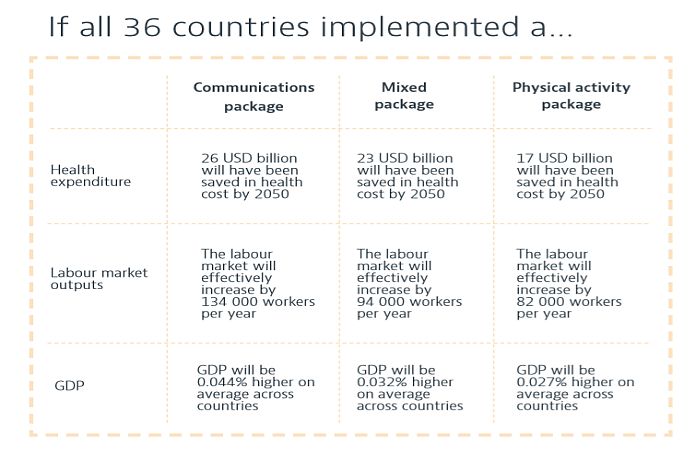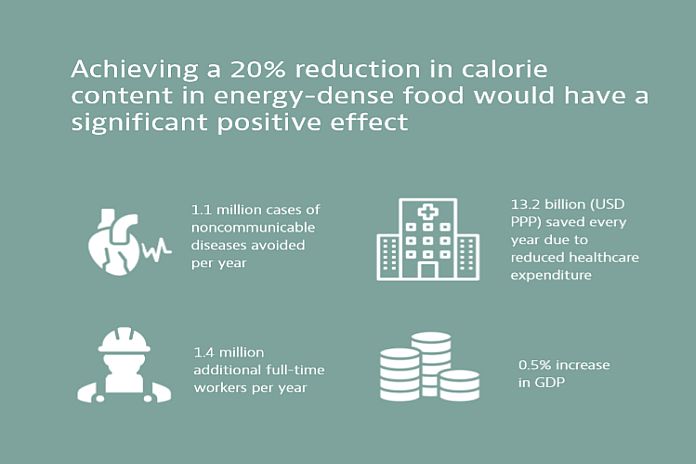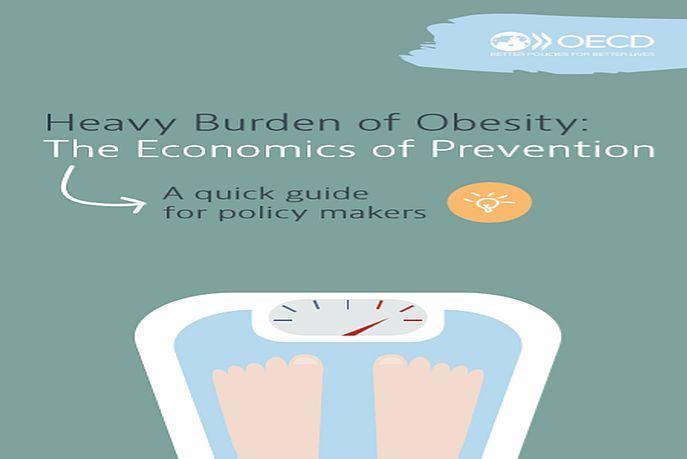Obesity is a large and growing public health challenge. Nearly one in four adults are obese, which has a considerable impact on population health, societies and the economy. However, a wide range of public health initiatives exists that save money and lives.
A new OECD report, The Heavy Burden of Obesity, analyses the cost of overweight and shows the positive impact of various policies on health and the economy.
This policy brief gives an overview of the key messages and highlights some of the evidence presented in the report.
Key messages
Overweight and its associated chronic diseases have a negative impact on societies and the economy.
- Overweight and its associated chronic diseases such as diabetes, cardiovascular diseases, and cancer reduce life expectancy in OECD countries by 2.7 years on average.
- 4 percent of the health budget of OECD countries will be spent to treat the consequences of overweight over the next thirty years.
- Overweight also negatively impacts educational outcomes, as children with a healthy weight are 13 percent more likely to report good performance in schools.
- Overweight reduces employment and workers’ productivity. The impact can be quantified as equivalent to a reduction in the workforce of 54 million people per year across the 52 countries analysed, which include OECD, EU28, G20, OECD accession and selected partner countries.
- These effects combined, overweight reduces GDP by 3.3 percent on average in both OECD countries and EU28 member states.
Public health actions to promote healthier lifestyles have a positive impact on population health and are an excellent investment for countries.
- Up to 76 000 cases of chronic diseases per year can be avoided across 36 OECD countries by implementing different public health interventions to provide information, increase the availability of healthy options, modify the price of health-related choices, and to regulate or restrict unhealthy choices.
- For each 1 USD dollar invested in tackling overweight, up to 5.6 USD will be returned in economic benefits.
- Health budgets for all the 36 countries included in the study could save up to 26 USD billion, adjusted for differences in purchasing power across countries, by 2050.
- Thanks to increases in employment and productivity, the total labour force can increase by an equivalent of about 134 000 full-time workers per year.
Overweight is growing, underpinned by unhealthy diets and lack of physical activity
Almost a decade after the publication of the first OECD report on obesity, “Obesity and the Economics of Prevention – Fit not Fat”, overweight continues to be a pressing public health issue despite the policy responses put in place by countries:
- While in 2010 about one in five people in OECD countries were obese, this has now risen to nearly one in four.
- In the vast majority of OECD member countries, more than half of the population is now overweight.
- In the last few years, there has also been significant growth in morbid obesity. Poor diet, lack of physical activity and sedentary behaviour have contributed to the obesity epidemic
Poor diet, lack of physical activity and sedentary behaviour have contributed to the obesity epidemic:
- 50 percent of people have an unhealthy diet (measured against national guidelines)
- 40 percent of waking time is spent in sedentary activities (e.g. watching tv)
- 2 in 5 individuals do not consume a sufficient amount of fruit and vegetables
- 1 in 3 people do not do a sufficient amount of physical activity
Source: OECD analyses on national health and time use surveys
Overweight and related diseases reduce life expectancy by 2.7 years
Over the next 30 years, overweight will result in 462 million new cases of cardiovascular disease in the 52 countries, and 212 million cases of diabetes among other diseases.
As a result, people will live on average 2.7 years less due to overweight, across OECD countries. This decrease in life expectancy is the average across the total population not just for people who are overweight.
Overweight impacts health budgets substantially
People who are overweight require healthcare services more often and for more complicated issues. This raises health expenditure by 209 USD per capita across the OECD. On average, OECD countries will spend 8.4 percent of their entire healthcare budget on treating the consequences of overweight over the next thirty years.
Obesity damages educational outcomes, labour force productivity and the economy
Compared to children with a healthy weight, children who are overweight have poorer school performances. When children with overweight grow up, they show lower school attainment and a lower likelihood of completing higher education.
- On average, boys and girls with a healthy weight are 13 percent more likely to report good school performance, compared to their peers with obesity.
- Girls who are obese are three times more likely to be bullied than their peers with a healthy weight, compared to 1.8 time for boys.
- In the United States, boys and girls aged 12-19 who are obese are three percentage points more likely to miss school compared to adolescents with a healthy weight.
Obesity also has a considerable impact on the broader economy as it reduces labour force productivity and human capital.
Individuals with chronic diseases are more likely to be unemployed and to miss days of work. When they are at work, they may also be less productive than healthy individuals. Across the 52 countries included in this analysis, overweight effectively reduces the workforce by about 54 million people per year:
- 28 million full-time equivalent due to reduced employment.
- 18 million full-time equivalent due to reduced productivity when at work (presenteeism).
- 8 million to absenteeism.
The macro-level effect is that overweight reduces GDP by 3.3 percent on average in both OECD countries and EU28 member states.

The obesity epidemic places a heavy burden on individuals’ society and the economy.
Over half the population in OECD countries is overweight, with nearly 1 in 4 people considered obese. In the next 30 years, this will cause 220 million cases of noncommunicable diseases (NCDs) in OECD countries.
These NCDs will reduce life expectancy in OECD countries by 2.7 years across the population, and their treatment will account for 8.4 percent of all health expenditure.
Overweight disadvantages children, as boys and girls with a healthy weight, are 13 percent more likely to report good school performance. In adults, overweight lowers labour market outputs, effectively reducing the workforce by the equivalent of 18 million full-time workers in OECD countries.
Overall, overweight reduces the gross domestic product (GDP) by 3.3 percent. To cover the cost of overweight, every person effectively pays 359 USD per year in taxes due to overweight. The process is illustrated in the mind map [above].
Countries have implemented policies to tackle obesity, but gaps remain
Countries have made substantial progress in implementing policies to tackle unhealthy diet and lack of physical activity in the last decade. Almost all of the 52 countries analysed have a national action plan on obesity in place. A vast majority of countries have a specific action plan to tackle obesity in children, as well as national guidelines to promote healthy diets and active lifestyles.
In general, countries have been particularly active in putting in place policies to provide information and to increase the number of healthy options available for people to choose from. Policies to modify the cost of health-related choices, such as taxes on energy-dense food and drinks or subsidies for healthy choices, and to regulate unhealthy choices, such as restrictions on advertising, are less widely implemented.
Despite this, the growing overweight rates show that, so far, the response has not been fully up to the challenge. In a number of cases, policies are implemented in forms that are not the most effective or actions are not uniformly implemented throughout the country. In other cases, limited resources or practical problems end up limiting the number of individuals that would potentially benefit from the intervention.
To understand the impact that various policies have on population health and the economy, the OECD analysed a range of policy options and packages.

Comprehensive public health policy packages improve population health…
To tackle the growing obesity epidemic, OECD countries need to implement comprehensive prevention policies. Policy packages to promote healthier lifestyles have a positive impact on population health and are an excellent investment for countries. The OECD report assesses three policy packages:
A communications package that combines food labelling, advertising restrictions, and mass media campaigns. While many countries already have these policies in some form, they are often not designed or implemented for maximum impact.
A mixed package, consisting of policies that are less wide-spread including menu labelling, prescribing physical activity and workplace wellness programmes. These more innovative interventions provide an opportunity to step up the policy response.
A package to promote physical activity, through prescribing physical activity, public transport interventions, physical education in schools and actions to counteract workplace sedentary behaviour.
The three policy packages significantly reduce the burden of disease caused by overweight. The ‘communication package’ has the potential to save 76 000 cases of new NCDs per year, across the 36 countries analysed. The ‘mixed package’ could save 61 000 cases of NCDs per year. The ‘physical activity package’ could save 38 000 NCDs per year.
… And they have a positive impact on the economy
In addition to improving population health, policies to prevent obesity have a positive impact on the economy, as they reduce health expenditure and increase labour market outputs. Combined with their impact on population health, these policy packages can increase GDP.


The cost of implementing food advertising restrictions, mass media campaigns, menu labelling, and workplace sedentarity programmes is about 20 percent or less of the predicted benefit to the economy. The cost of implementing food labelling or mobile apps is about 40 percent of the benefit in terms of GDP. The cost of the most costly interventions such as workplace wellness, prescribing physical activity and school physical activity programmes roughly correspond to their GDP benefit. In other words, for each dollar invested in the prevention of obesity, up to 5.6 USD will be returned in total economic benefits (i.e. GDP) each year.

In recent years, many OECD countries have shown a growing interest in policies promoting food reformulation. For example, in 2018, Public Health England published a reformulation programme challenging the industry to reduce calories by 20 percent, by 2024 in foods high in sugar, salt, calories and saturated fat, such as ready meals, pizzas, snacks sauces, and dressings. Also in 2018, the OECD put forward to the G20 a proposal for a global deal between national governments and industry to scale up these efforts at the global level.
Of course, a global deal to reduce calorie content in relevant food by 20 percent would not address all the causes underpinning the obesity epidemic, including for example low levels of physical activity. That said, the OECD model calculates that if such a plan were to be implemented in 42 countries worldwide, it would have a significant impact on the health and the economy of countries. It would improve population health, save health expenditure, improve workplace productivity and increase GDP.
For the full report, please visit






